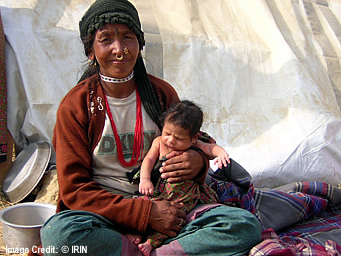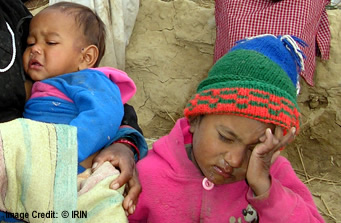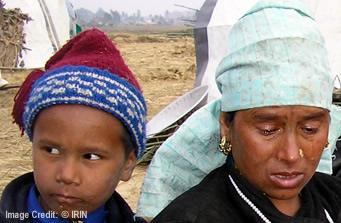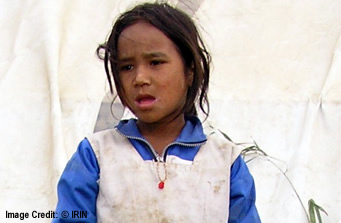|
Nepal
in Crisis 2006: Human Rights
|
| Families
despair over missing relatives |
 |
KATHMANDU,
18 January 2006 (IRIN)
From
dawn to dusk, Shanta Bhandari spends her time looking for her son, who
disappeared in 2002 when the Nepali police arrested him on charges of working
with the Maoist rebels, who have been waging an armed rebellion against
the state for the last 10 years.
 |
<<
Refugees at an IDP camp in Rajhena of Nepalgunj
But
her 21-year-old son Bipin was just a student at the time and a member of
the Maoist-affiliated All Nepal National Free Student's Union-Revolutionary
(ANNFSU-R).
Until
2002, the union had not been directly involved in Maoist activities. But
after the breakdown of second ceasefire in 2003, the union started to affect
the educational sector by constantly calling national education strikes,
was involved in extortion, as well as bombing schools to pressure the government
to meet their demands to nationalise all private schools and remove the
terrorist tag from their union. |
|
In
2005, the government has again banned ANNSFU-R slating it as terrorist
organisation.
Bhandari
and other mothers whose sons were arrested on the same day set out on a
mission to force the state authorities to reveal the whereabouts of their
sons. They approached almost all organisations they thought would help
pressurise the government. They pleaded for help from local human rights
groups, the National Human Rights Commission (NHRC), the International
Committee of the Red Cross (ICRC), the United Nations office in Nepal,
the Supreme Court and even the Royal Palace, but the government paid
little attention.
 |
<<
Bacchu Rokaya's children at an IDP camp in Rajhena of Nepalgunj
They
finally went to the police headquarters responsible for the disappearance,
where authorities there promised to call them after a week. But three years
on they heard nothing. Instead, they came to arrest Bhandari's husband,
a lawyer, again accusing him of working for the Maoists. He has since gone
into hiding, leaving Bhandari and her young daughter on their own to be
constantly hounded by threatening calls from the police. |
|
"My
heart tells me he is still alive," said Bhandari, who explained that instead
of crying at home helplessly, the best way to remain strong was by campaigning
for justice from the state authorities: not just for her son but for all
such disappearance cases.
Later
in 2002, having failed to get anywhere with the government, Bhandari and
three of the other mothers organised a hunger strike in the middle of the
capital, Kathmandu.
The
country was then under a state of emergency, imposed by the government
of former prime minister Sher Bahadur Deuba.
 |
<<
Refugees in Nepal: Bacchu Rokaya and her son at an IDP camp in Rajhena
of Nepalgunj
| Deuba's
government introduced the Terrorist and Disruptive Activities Act (TADA)
which gave unlimited powers to the police to arrest anyone they suspected
to be Maoist. By 2003 and 2004, Nepal had recorded the highest number of
new cases of disappearances in the world, according to the United Nations
Group on Enforced and Involuntary Disappearances.
Human
rights groups also reported that the majority of people arrested by the
police and army were innocent civilians. |
|
Almost
100 other parents joined Bhandari in her hunger strike as news of the campaign
spread around the country. The issue finally got high-profile attention
from the media and human rights groups, who started to pressurise the government.
Finally, after a four-month long hunger strike, the government revealed
the names of 18 out of 132 disappeared persons in 2002.
The
families also set up Rajya Dwara Bepatta Pariyeko Pariwar Samaj (the Society
of families of missing persons by the state), which is leading a campaign
to help all those who disappeared following detention inside police stations
and army barracks.
 |
<<
Refugees in Nepal: Bacchu Rokaya's girlat an IDP camp in Rajhena of Nepalgunj
| According
to the NHRC and local human rights group, Insec, there remain some 1,000
people still missing after they were arrested by security forces and held
in detention centres.
Exact
numbers are hard to pin down as many cases remain under-reported due to
fear of the security forces, who often threaten the families to prevent
them from talking to human rights organisations. Those who suffer most
are the rural poor who have little to no information or power to register
their cases. |
|
"The
numbers are hard to confirm because many families are afraid to report
the cases of either disappearances or those who have been released from
detention," said advocate Kopila Adhikari from Advocacy Forum, an activist
group against illegal detention and extrajudicial killings. The forum alone
has registered around 550 disappearance cases from nearly 25 districts
since 2001.
The
National
Working Committee of Disappearances, established with help from the
UN's
Office of the High Commissioner for Human Rights (OHCHR) in Nepal,
is preparing a report on confirmed data of the disappeared, which will
be released within a month.
"Once
we have the accurate data, we will start filing the cases at the Supreme
Court," said Adhikari, who coordinates the committee, which has also planned
to lodge cases at the UN's Human Rights Committee (Covenant on Civil and
Political Rights) if their efforts fail to pressurise the government.
The
number of disappearances increased further after the breakdown of the first
peace talks in 2003, when the Maoists scaled up violence and the security
forces were given more sweeping powers to arrest any suspect.
"In
almost all cases documented by Human Rights Watch (HRW), witness testimony
confirmed that individuals who "disappeared" were last seen in the custody
of government security forces, who had detained them during large-scale
operations or targeted raids, arrested them at checkpoints, or had simply
taken them away from places of work or study," said the HRW report, 'Clear
Culpability: Disappearances by Security Forces in Nepal".
The
report added that the Maoists have been less accused of disappearances
because the rebels openly executed their victims in public forcing relatives
and villagers to witness the killings of those accused of working as government
spies or defying the Maoists.
Despite
the critical situation of disappearances, some international human rights
watchdogs, such as the Asian Human Rights Commission (AHRC) and
Human
Rights Watch (HRW), have criticised the international community for
failing to respond effectively. "The AHRC has been continuously pleading
with the international community to intervene since cases of extra-judicial
killing and disappearances are on the increase in Nepal," said a December
report by the group. It added that the majority of cases fail to be investigated
on the grounds that the Royal Nepalese Army is beyond the reach of any
domestic law in Nepal.

|
|
Refugees
in Nepal: Bacchu Rokaya and her children at an IDP camp in Rajhena of Nepalgunj
|
Credit
IRIN 2006
Copyright
© UN Office for the Coordination of Humanitarian Affairs 2006
[
This report does not necessarily reflect the views of the United Nations]
Integrated
Regional Information Networks (IRIN), part of the UN Office for the Coordination
of Humanitarian Affairs (OCHA).
.
..

|








